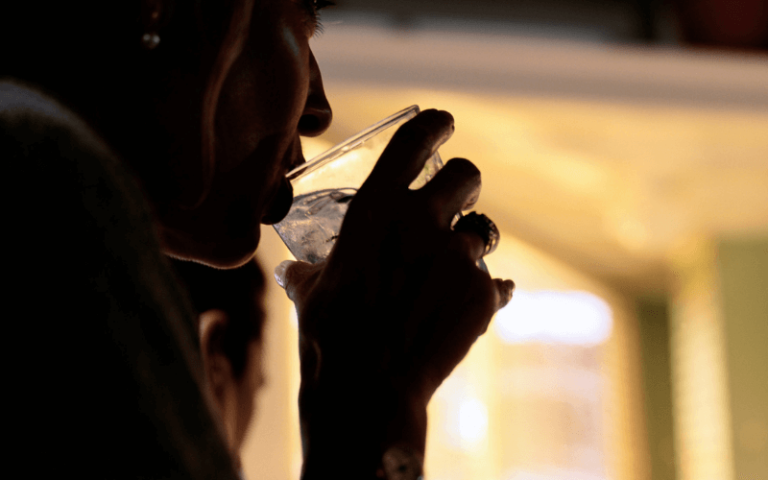
This article discusses substance abuse which may activate challenging memories or discomfort. If you need further support, please reach out to the services at the base of the article. If you need urgent help, contact Lifeline on 13 11 44. All opinions are those of the author and guest and do not necessarily express the view of Music Victoria or Partners in Wellbeing.
As a mental health professional and someone with prior lived experience of my own challenges with alcohol, it’s unsurprising there’s a struggle in the community when it comes to addiction. Australia in general has a complex narrative regarding alcohol. Perplexing that alcohol is our nation’s most widely used social drug, whilst also being a depressant, slowing down the messages travelling between the brain and body from our very first sip. A Social Depressant. What a band name.
This blog is not intended to wank on about whether you should or shouldn’t experience alcohol or drugs, there’s certainly a huge amount of people who have a balanced relationship with substances. However, I am keen to further discover why, despite all the evidence plonked in front of us, our industry still immensely struggles with the challenge of addiction.
I drummed at my first live gig when I was sixteen years old at a 21st birthday in Auckland, New Zealand. Our bassist was a few years older and had been recording and playing for a few good years. “You seem way too stressed, drink this.” He thrust a bottle of bourbon into my hands before we jumped on stage, assuring me it would make for a better gig. In my case, it did not.
My technique was floppy and fumbly, my right leg wouldn’t work; we were understandably heckled by the irritated punters who wanted a polished version of “Bomb Track” by Rage Against the Machine.
Many musicians have some variation of this narrative as a young artist, and whilst these early formative experiences may seem harmless, you’ve got to stop and wonder how many jobs would not only tolerate drinking on site but encourage it – particularly in the formative stage of our careers.
Musician & Psychotherapist, Glen Benton. Pictured in his home studio.
[Image Description: Black and white image, in front of studio. Glen has mid-length brown hair].
G: I think there’s a tribal baseline element of substance use to change consciousness. I think in a way we tap into some very almost inter-dimensional, millennia old traditions when we create music and art for people to gather, enjoy and celebrate. I’ve enhanced my creative experience over the years experimenting with things, it can enhance art; but by the same token once you start to lose your freedom to that substance it becomes something of an issue. The art is driven by the substance use in that case, and that becomes a problem.
G: For me it was about setting the intention to do things differently. I also chose a bit of isolation, but a healthy form of isolation. Before or after a gig, I would prepare stuff, whether it was in the hotel or bus. I would prepare a movie to watch or make myself a meal to have right after the show…or read a book I was super into. Sometimes I’d even tee up a friend to make sure I wasn’t going to make decisions I’d regret after the gig.
G: Try to talk to a professional. Substance abuse situations could be like other crisis situations, they’re sometimes similar to a mental health breakdown. It is a particular phenomenon that, unless you have experienced it yourself, or have been trained to understand that experience specifically, then you may be unable to respond and support that person the way they need for their own best outcomes. Talk to a drug and alcohol support service, or if you trust your doctor – they can help you too. Speaking to someone who is trained in substance issues is a good way to go. It is a very individual and specific experience to go through for any person, so it’s important to seek support from the trained professionals.
Addiction can be broad in its root cause, the outlet could be prescription drugs, narcotics, food, or technology. Generally, we use these things as a way of coping with a situation, or to distract ourselves from something unresolved within us. The subconscious intention of addiction is designed as a protective mechanism, so there’s no need to self-direct shame or judgement.
If the symptoms are impacting your sense of self, it could be worth talking to someone. You don’t have to go it alone; check out the below state-based services that can offer a free confidential chat.
DirectLine (Victoria) 1800 888 236
Counselling Online (Turning Point)
SuicideLine Victoria 1300 651 251
Gambling Help Online
TouchBase LGBTQI
Support Act Wellbeing Helpline for Musicians 1800 959 500
Music Victoria, in conjunction with the Partners in Wellbeing program, has secured a Mental Health Clinician/Consultant, and that person is me – Bree ????
The pandemic has been tough, it's important we get the jump on our mental health as we return to a new world of normal.
This new service offers free and confidential mental health support for you, your families, and employees. Along with the one-on-one sessions, we can refer you to our free financial counselling and business advisory support services. If you’re keen to connect, I am available for a chat Monday to Friday, 9am to 5pm.
If your issues are not urgent, and you’d like to have a chat with me directly, you can self-refer by emailing bree@musicvictoria.com.au or by making a booking here. Don’t forget, family and staff members are also most welcome to connect in with me for support.
Contact Details
Email: bree@musicvictoria.com.au
Phone: 0409 299 292
Hours: Monday to Friday, 9am to 5pm
Outside of Business Hours
Outside of business hours, you can connect with the Partners in Wellbeing Helpline on 1300 375 330.